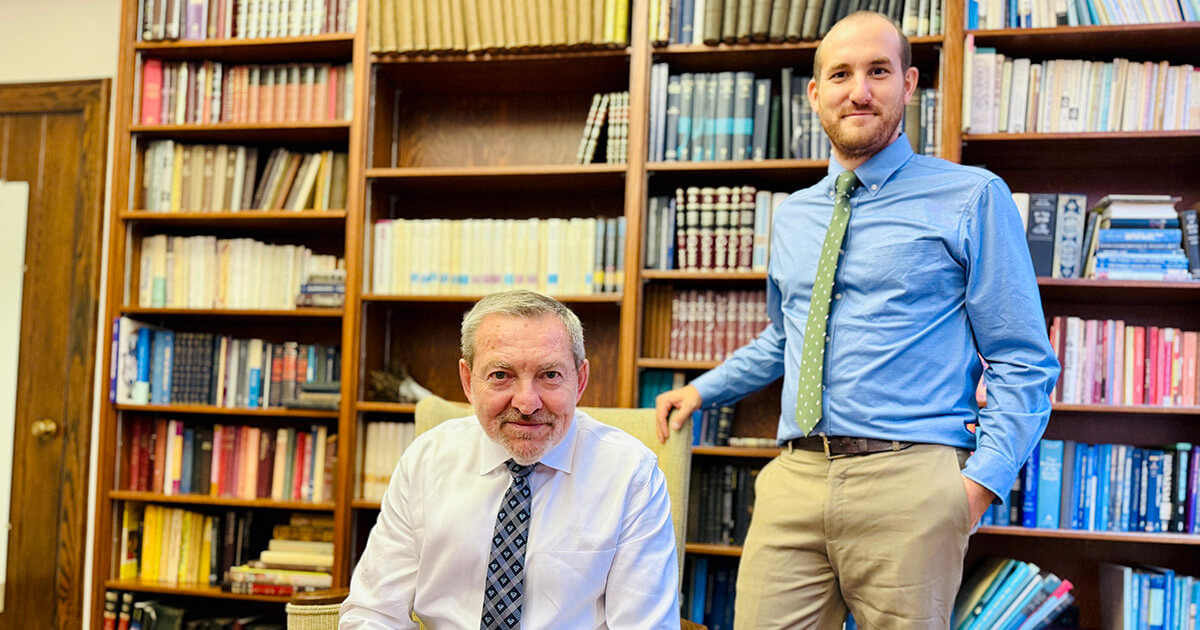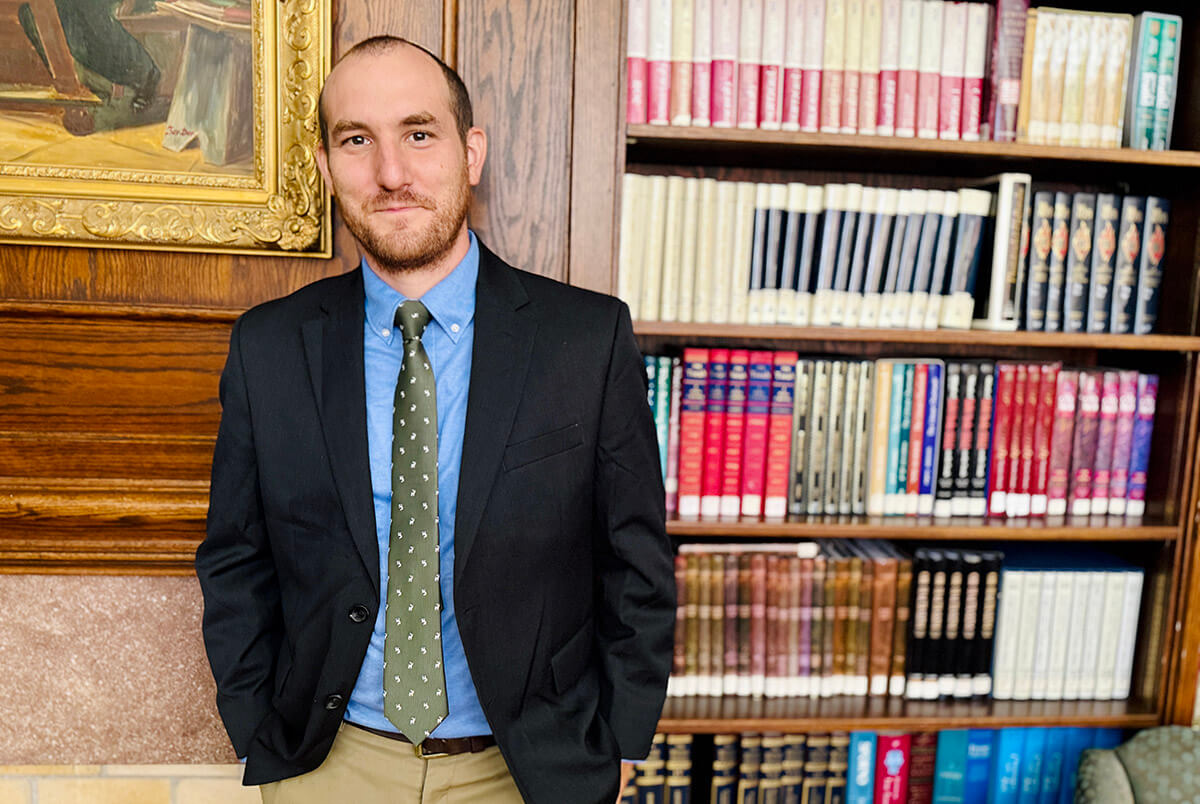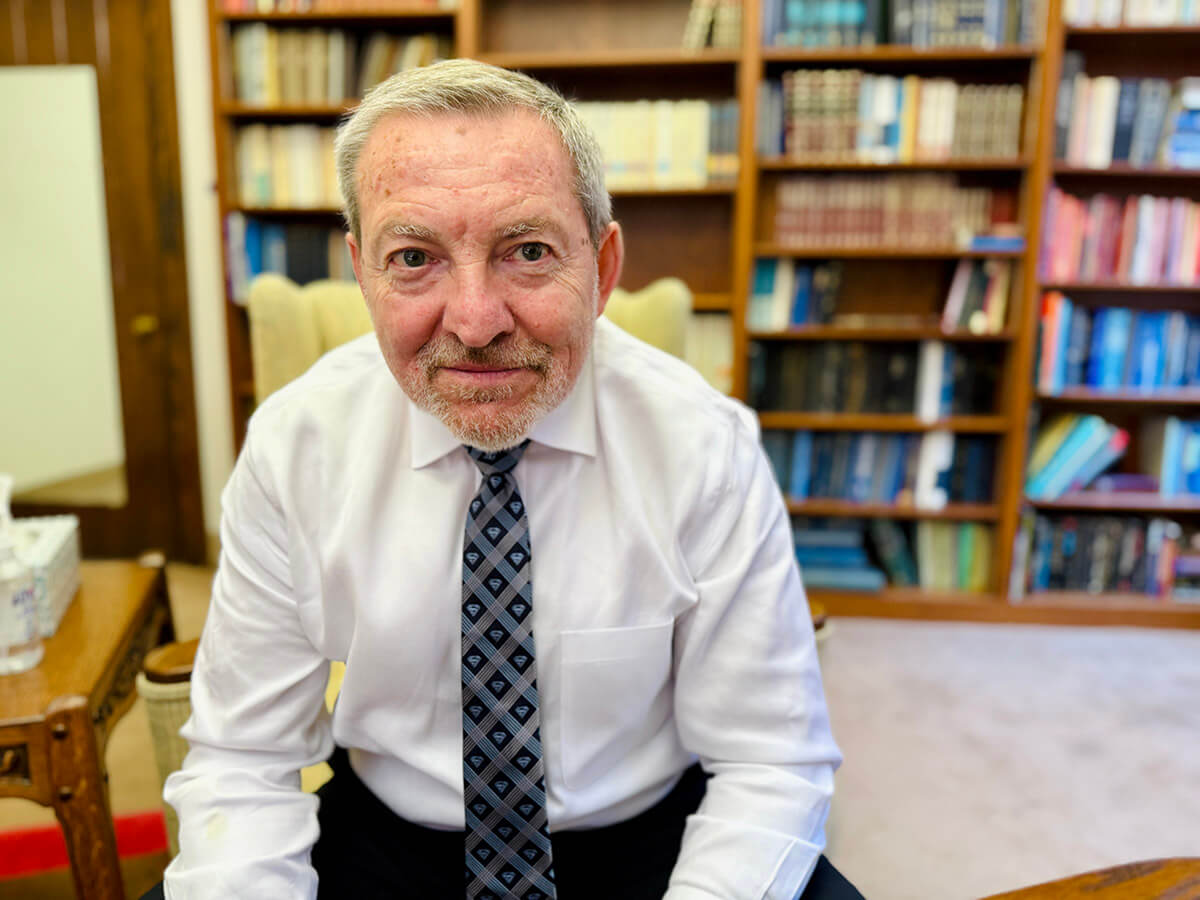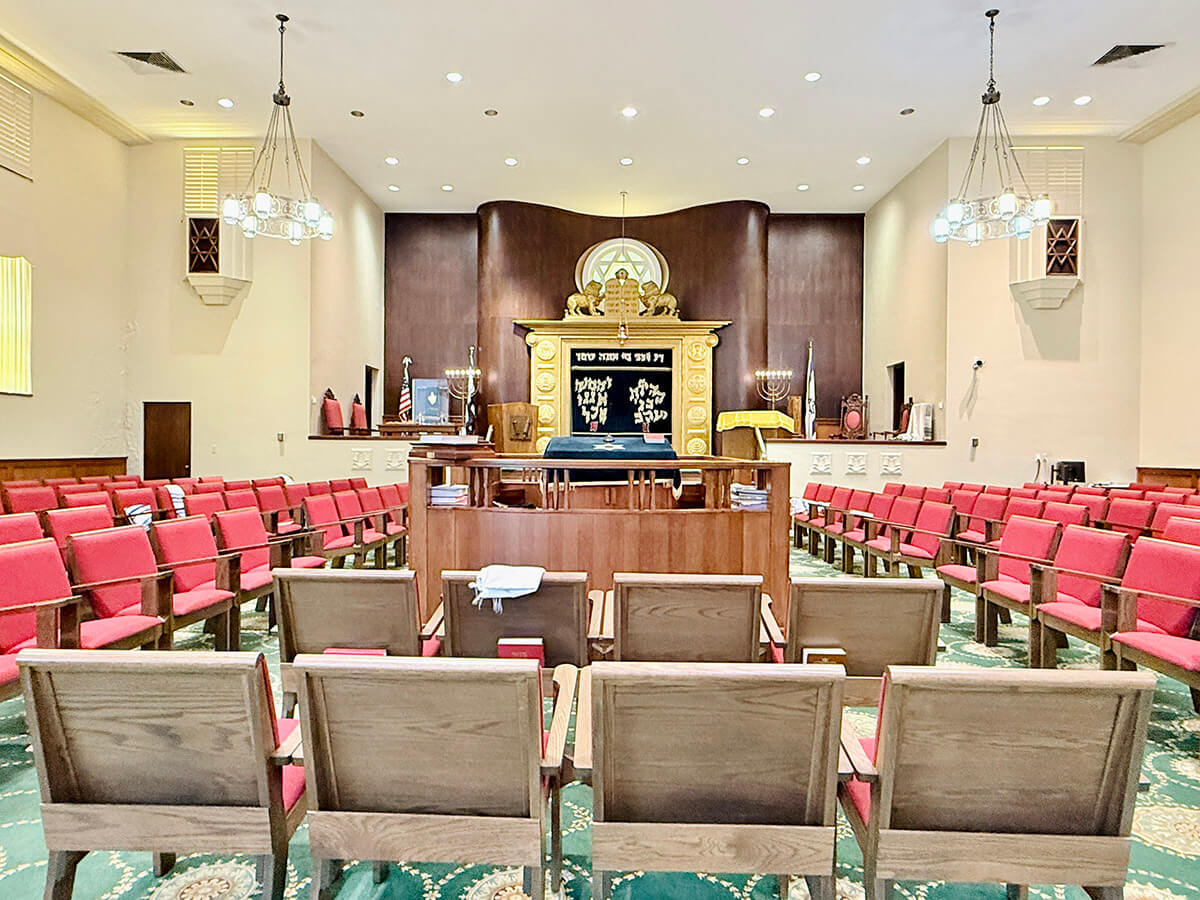This small, stubborn Appalachian synagogue is defying the odds — and so is its new rabbi
In Charleston, West Virginia, a century-old congregation is betting that a 30-something rabbi with two little kids can keep its doors open for decades

Rabbi Victor Urecki, left, and his successor, Rabbi Adam Berman. Photo by Benyamin Cohen
CHARLESTON, WEST VIRGINIA — Rabbi Adam Berman had been in Charleston for less than a week, and already he was watching his last Shabbat from the pews of Congregation B’nai Jacob.
Next Shabbat, he would become the new spiritual leader of the synagogue — his first pulpit, in a city he had never lived in, inheriting a community shaped for nearly four decades by the man now leading the prayers.
Just beyond the parking lot, the gold dome of the State Capitol gleamed in the August sun. Charleston may be small, but as West Virginia’s capital, it gives its rabbi an outsized role — benedictions at public ceremonies, quiet meetings with the governor, and the responsibility of making sure Jewish concerns are heard in a place where the community is small but its voice carries.
Berman is stepping into a role that is dwindling.
For most of the 20th century, the number of synagogues in America climbed. But in the past few decades, that trend has reversed. There are roughly 20% fewer synagogues today than there were in 1990, according to Alanna E. Cooper, a religious studies professor at Case Western Reserve University. More close each year than open.
In a season of shrinking and closing congregations, B’nai Jacob is staging something rare: an opening act — hiring a young rabbi, married with two little kids, who hopes to make this his long-term home.
Nearly every seat was filled that morning, with dozens more watching on Zoom — a testament to Rabbi Victor Urecki’s tenure and the loyalty of Charleston’s Jewish community. The week’s Torah portion, Vaetchanan, offered an unplanned symmetry: Moses, at the end of his life, delivering his final orations to the Israelites.

Berman, 35, watched as Urecki, 64, silver-haired and wearing a colorful knit kippah, called up old friends for aliyot, cracking jokes with them at the bimah. When it was time to read from the Torah, Urecki’s grandson, Caleb, a young boy in a black yarmulke, opened the ark, revealing eight scrolls. He grinned and high-fived his grandpa.
Rabbi Joe Blair, who leads Charleston’s Reform congregation, Temple Israel, came for Urecki’s final service, bringing some of his own congregants with him. At one point, Blair, Berman and Urecki were all called to the Torah — likely the most rabbis gathered in one room in Charleston in years.
Berman studied it all knowing this was the last time he would watch from the quiet side of the sanctuary.
The Orthodox congregation began with 17 members in 1894, meeting under the guidance of kosher butchers, cantors, and Hebrew school teachers. It wasn’t until 1904 that B’nai Jacob hired its first ordained rabbi, Nachman Heller, known for keeping a bag of candy in his desk “to reward the good and to win over the mischievous,” according to a printed synagogue history.
The community grew in fits and bursts — 60 families by 1908, 225 by 1931 — swelled by newcomers working in the city’s powder plants during World War I.
B’nai Jacob has had only three rabbis since 1932 — an almost unheard-of continuity in American Jewish life. Like Urecki, Rabbi Samuel Cooper was a young Yeshiva University graduate when he arrived in Charleston in 1932. It was his first and only pulpit, and he stayed for 49 years. He was named West Virginian of the Year in 1967, celebrated his 15th anniversary as rabbi with a gift of a Chrysler from friends, and once phoned in to a B’nai Jacob Chanukah gathering from the World Zionist Congress in Switzerland.
Cooper was succeeded by Rabbi Chaim Landau, and then Urecki, who came in 1986 at age 24 and never left. The congregation, founded as Orthodox, became Conservative in 2017.

Urecki’s first and only pulpit became the anchor of his professional and personal life — he moved here two weeks after he got married, raised three daughters here, and now has a grandson growing up in the same city. His mom and dad, both in their 90s, also live in Charleston.
Charleston’s own trajectory mirrors that of B’nai Jacob.
The city’s population boomed to 86,000 by 1960, fueled by two massive chemical plants. Union Carbide — a major producer of synthetic rubber during World War II — provided hundreds of jobs. For generations, political power in West Virginia flowed through heavy industries like coal, chemicals, steel and natural gas. But like much of Appalachia, Charleston has suffered the shuttering of plants and factories, leaving economic hardship and population loss. West Virginia is now among the poorest states in the nation. Charleston’s population has dropped to around 48,000, according to the latest census.
Sanctifying superheroes
The synagogue weathered those same headwinds. Membership peaked at 408 families in 1949; when Urecki arrived in 1986, it had fallen to about 210, and today stands at roughly 170. “All things considered,” he said in an interview recalling his 39 years at the shul, “that’s not a huge loss.”
The building itself — a midcentury sanctuary — still looked much as it had when Urecki first walked in.
The green carpet underfoot was worn smooth in the spots where generations had stood for the Amidah, their weight pressing the fibers like a memory. The sanctuary is adjacent to what was once a gymnasium and is now the social hall, able to seat hundreds when merged together — as it was for Simcha ’72, a four-day homecoming that included Fiddler on the Roof numbers performed by the Charleston Light Opera Guild.
In the corner this Shabbat, an AV tech sat before two computer monitors, orchestrating the multiple camera angles for the remote audience — a post-pandemic opportunity that attracts many Charleston expats, drawn back into the congregation of their youth.
“This day is not about me,” Urecki began his final sermon. “This day is about you. It’s about this community — its remarkable story, its legendary past, its glorious present, its bright future.”
He told them there were two questions he’d been asked throughout his career. The first: Why Charleston? He had options — pulpits in bigger cities, historic congregations, those out West with better weather. Instead, he chose a place most of his classmates could not locate on a map.

To answer, he turned to the Torah: God did not choose the Israelites for their numbers. “You don’t have to be large in order to be great,” Urecki said, quoting the Book of Zechariah: “Not by might, nor by power, but by my spirit.”
Charleston, he told them, “had that shine” from the moment he arrived — “not just another warm shul,” but one “punching far above its weight class,” thriving despite its isolation and the city’s economic decline. “Here we are,” he said. “Hineni.”
The second question: Why stay? For that, he reached for his lifelong love of comic books. In his office, Spider-Man shared shelf space with the sages.
The original Fantastic Four hit newsstands on Aug. 8, 1961 — the day after he was born. It was the beginning of the Marvel universe, and its heroes weren’t just teammates. They were family: bound together by loyalty, shared purpose, and the promise that they would face whatever came next, together.
“That’s why we stayed,” Urecki told the packed pews. “Because soon after we came, we discovered this wasn’t just a congregation. This was a family.”
He never had a contract, never kept office hours. “That’s what you do if you have a job,” he said. “But this was family.”
‘A big fish in a little pond’
The job of finding Urecki’s successor fell to a search committee chaired by Charleston attorney Marc Slotnick. “Generally, Charleston is not the location of most rabbis,” he said. “For a small congregation in West Virginia, it’s not necessarily the most enticing place.”
Slotnick’s pitch emphasized the upside of small-town Jewish life: “You can be a big fish in a little pond. You know your senators, you know your congresspeople, you know the mayor.”
Berman’s path to Charleston began far from the Appalachian hills. He grew up in Columbus, Ohio, the son of a Conservative pulpit rabbi, spending summers at Camp Ramah and leading United Synagogue Youth programs. Yale came next — he graduated in 2013 — and then a leap across the ocean: aliyah to Israel, where he served on the Gaza border as a lone soldier in the Israel Defense Forces and, for a time, as a shift manager at a carrot-packing facility on a kibbutz.
Rabbinical school took him back and forth — starting in New York, finishing in Jerusalem — and along the way he met Emunah, known as Emmy, an Israeli educator. Now they’ve arrived in Charleston with two young children, Asaf and Nili, ages 3 and 1, crossing oceans for a calling.
Ordained in 2022, Berman spent three years directing a Jewish Agency program linking communities in Israel’s Arava desert with Australian Jewry. But he found himself drawn to the American pulpit rabbinate.
He wasn’t looking for Charleston specifically. “But even from reading the job listing, I could feel the warmth of the community,” he said. Visiting in person confirmed it. One bonus: Columbus, where his parents still live, is only a three-hour drive.
Berman’s vision is shaped by his own upbringing. “I think being in a small community where the work is to try to engage a smaller pool of people has its own sort of power,” he said.
Growing up, Berman found “it was very formative” to be one of the few Jews at his high school who took off for the Jewish holidays. “For me, that was a very powerful and strong thing for my Jewish identity,” he said. “So, I certainly think that there are ways to raise kids with a strong Jewish identity. Perhaps not in spite of the fact that we live in a smaller Jewish community, but davka [specifically] in a small Jewish community, and being one of the few Jews in a given educational setting.”
He added: “Perhaps it’s also a mission for me. I’m not floating the idea of opening a school at the moment, but a strong enough sort of framework, structure, programming, Jewish education for young families in Charleston. Both because I think my children deserve that, but also any Jewish families who are interested in providing that for their children also deserve that.”
He plans to start with listening. “It’s not like a presidential campaign with a 100-day plan to revolutionize everything,” he said. “First and foremost, my job is to get to know the people, the needs, the desires.”
He knows the challenges. Charleston’s Jewish population is around 500. Many members are interfaith families. “There’s a lot of importance in making sure people feel comfortable and welcomed and not judged,” Berman said. “To meet them where they are and provide programming, learning and social opportunities that are relevant to them.”
Urecki, too, sees that as the path forward. Growth, he said, will come from engaging interfaith families and even non-Jews who feel a kinship through social justice work or adult-education classes. About half the participants in his Torah study are not Jewish.
After the final mourner’s kaddish, Urecki recited kiddush over wine and the blessing over challah, cutting pieces and handing them out to congregants. In the social hall, lunch was bagels, lox, tuna salad, gazpacho and baked goods. The centerpieces were printed in bold comic-book font — “BOOM” and “BANG” — a wink at the rabbi’s lifelong love of superheroes.
Urecki and his wife, Marilyn, have moved into a home nearby. They are staying in Charleston — the city that took a chance on a 24-year-old from New York, and that he, in turn, never left.
Next Shabbat, Berman will stand at the same pulpit. He will inherit not just the Torah scrolls and the yahrzeit plaques, but the relationships and rhythms of a community that has learned to thrive in a place where the Jewish population can fit into a single wedding banquet hall.
“We are the most blessed rabbis on the planet,” Urecki told him from the bimah. Then he stepped down, leaving the Torah — and the family — in younger hands.
















